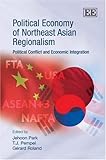Political economy of northeast Asian regionalism [Book] : political conflict and economic integration / edited by Jehoon Park, T.J. Pempel, Gérard Roland.
Material type: TextPublication details: Northampton, MA : Northampton, MA : Edward Elgar, c2008.Description: xii, 178 p. : ill. ; 25 cmISBN:
TextPublication details: Northampton, MA : Northampton, MA : Edward Elgar, c2008.Description: xii, 178 p. : ill. ; 25 cmISBN: - 9781847208910 (hbk.)
- 1847208916 (hbk.)
- 338.95 22
- 338.95
| Item type | Current library | Call number | Status | Date due | Barcode | Item holds |
|---|---|---|---|---|---|---|
 Books
Books
|
Junaid Zaidi Library, COMSATS University Islamabad | 338.95 POL (Browse shelf(Opens below)) | Available | 49687 |
Browsing Junaid Zaidi Library, COMSATS University Islamabad shelves Close shelf browser (Hides shelf browser)
Includes bibliographical references and index.
Functional integration in the economy has developed sufficiently in Northeast Asia. The problem, identified by this book, lies in the lag or deficiency of institutional integration. The main impediments to such a move come from non-economic factors including political conflict. This study proposes a Northeast Asian version of the regional integration model. A crisis model and a political leadership model are suggested, with political leadership playing a critical role in utilizing crises to advance regional integration. A market-based transition model and a development model are also offered to show how to ease the transition of North Korea and the development of underdeveloped parts of the region.This book is an objective analysis combining both 'insider' and 'outsider' (most notably US) perspectives of Northeast Asian regionalism. It also usefully applies regional integration theories to the realities of the Northeast Asian situation and presents policy options for regional integration. As the contributions form an interdisciplinary approach, covering economics and political science, the book will appeal to a wide readership. This will include academics and researchers of regional studies, political economy and Asian studies. Practitioners and policymakers working in this area will also appreciate it.
All.







There are no comments on this title.